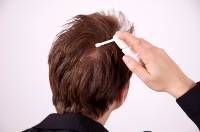
Not sure what the best hair loss medication is for you? Want to know more about hair loss treatments?
The right hair loss medication can definitely help prevent or stop hair loss. In some cases, hair can actually be regrown. There are 5 basic categories of hair loss medication: DHT inhibitors, growth stimulators, SODs, anti-inflammatory drugs and antiandrogens. Depending on the type of hair loss you are experiencing, you may need to use one or more of these products to see results.
Click Here To Discover The Best Hair Loss Medication For You!
DHT inhibitors block the action of the hormone dihydrotestosterone directly or indirectly. Indirect DHT blockers usually act on the enzyme 5-alpha reductase that converts the hormone testosterone to DHT. In either case, these drugs stop the action of DHT on genetically susceptible follicles, deterring hair loss at the source. Taken orally or applied topically, this type of hair loss medication is clinically proven to work for a large percentage of sufferers. Brand names to look for are Propecia®, Revivogen® and Crinagen®. Propecia®, generic name finasteride, is an oral medication and is available by prescription only. Revivogen® and Crinagen® are topically-applied products that do not require a prescription.
Growth stimulators are another class of hair loss medication. These products treat the symptom — hair loss — without concern for the underlying cause. For example, a growth stimulator may cause a follicle that is under attack by DHT to produce hair despite the attack. Although cosmetic in nature, this type of treatment is known to be effective. Perhaps the best-known growth stimulator is sold under the brand name Rogaine®. Folligen® and Tricomin® are two other brands to consider. All 3 products are topically applied and do not require a prescription.
SODs, also known as super oxide dismutase, work to control the immune response that occurs when DHT attacks a follicle, making the follicle seem to the body to be an attacking foreign substance. SODs also have growth stimulation properties, so they are a two-in-one type of hair loss medication. SODs are sold under the brand names Proxiphen® and Proxiphen-N®. Folligen® and Tricomin® also fall into this category.
The anti-inflammatory type of hair loss medication is used to control the symptoms which accompany the immune response, such as flaking, itching, redness and swelling. Nizoral®,
T-Gel® and Betadine® are examples of non-prescription anti-inflammatories. A doctor may prescribe topical corticosteroids in medium to very high strength. Steroid injections are another possible medical treatment.
Antiandrogens work to stop DHT (once it is formed) from binding to the androgen receptor, another stage in the process that attacks the follicle and ultimately leads to hair loss. Antiandrogen drugs intervene in the attack and prevent the damage normally caused by DHT.
Hair loss medication products with antiandrogenic properties include Revivogen®, Crinagen®,
Aldactone® (spironolactone), Nizoral® and Proxiphen®. Aldactone® requires a doctor’s prescription.
Before you begin taking any kind of hair loss medication, it’s important to see your doctor first. None of the products mentioned here will help you if your hair loss is caused by a treatable medical condition like thyroid imbalance or diabetes. Only a doctor can test for these and other diseases. To avoid disappointment, over-medication and possible side effects, you should seek sound medical advice.
Click Here To Discover The Best Hair Loss Medication For You!
